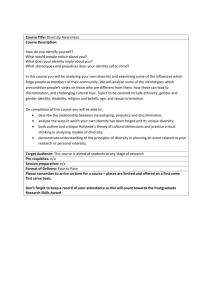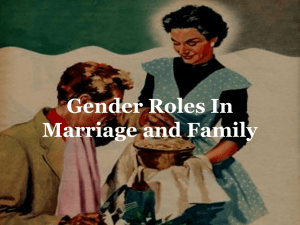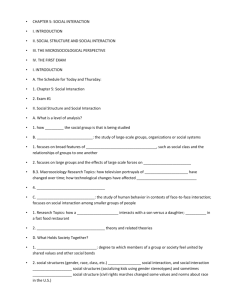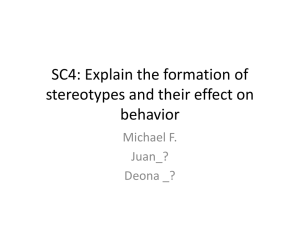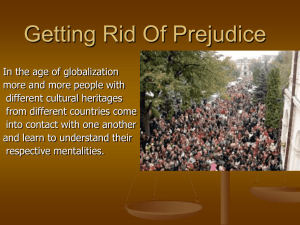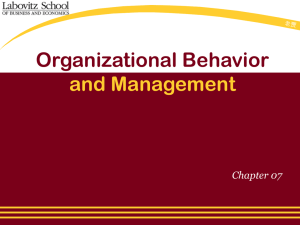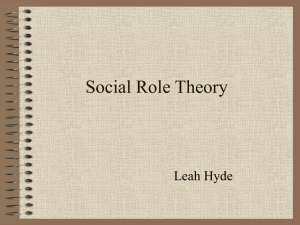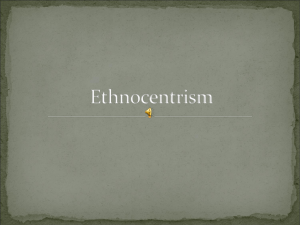intro_to_psychology_written_assignment
advertisement
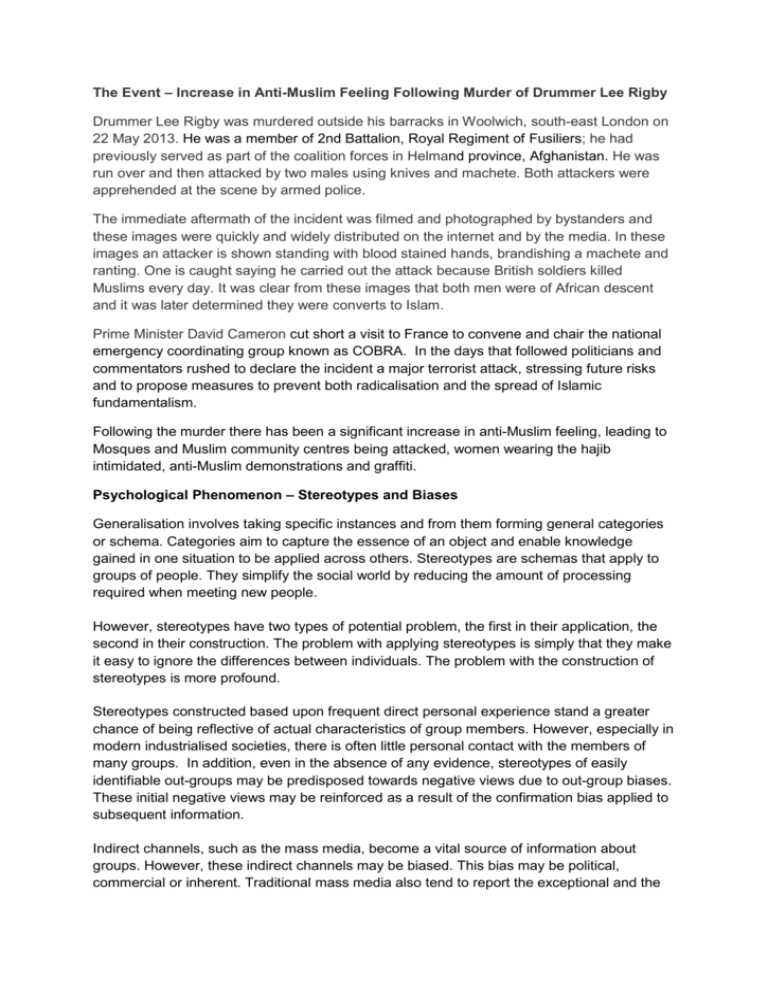
The Event – Increase in Anti-Muslim Feeling Following Murder of Drummer Lee Rigby Drummer Lee Rigby was murdered outside his barracks in Woolwich, south-east London on 22 May 2013. He was a member of 2nd Battalion, Royal Regiment of Fusiliers; he had previously served as part of the coalition forces in Helmand province, Afghanistan. He was run over and then attacked by two males using knives and machete. Both attackers were apprehended at the scene by armed police. The immediate aftermath of the incident was filmed and photographed by bystanders and these images were quickly and widely distributed on the internet and by the media. In these images an attacker is shown standing with blood stained hands, brandishing a machete and ranting. One is caught saying he carried out the attack because British soldiers killed Muslims every day. It was clear from these images that both men were of African descent and it was later determined they were converts to Islam. Prime Minister David Cameron cut short a visit to France to convene and chair the national emergency coordinating group known as COBRA. In the days that followed politicians and commentators rushed to declare the incident a major terrorist attack, stressing future risks and to propose measures to prevent both radicalisation and the spread of Islamic fundamentalism. Following the murder there has been a significant increase in anti-Muslim feeling, leading to Mosques and Muslim community centres being attacked, women wearing the hajib intimidated, anti-Muslim demonstrations and graffiti. Psychological Phenomenon – Stereotypes and Biases Generalisation involves taking specific instances and from them forming general categories or schema. Categories aim to capture the essence of an object and enable knowledge gained in one situation to be applied across others. Stereotypes are schemas that apply to groups of people. They simplify the social world by reducing the amount of processing required when meeting new people. However, stereotypes have two types of potential problem, the first in their application, the second in their construction. The problem with applying stereotypes is simply that they make it easy to ignore the differences between individuals. The problem with the construction of stereotypes is more profound. Stereotypes constructed based upon frequent direct personal experience stand a greater chance of being reflective of actual characteristics of group members. However, especially in modern industrialised societies, there is often little personal contact with the members of many groups. In addition, even in the absence of any evidence, stereotypes of easily identifiable out-groups may be predisposed towards negative views due to out-group biases. These initial negative views may be reinforced as a result of the confirmation bias applied to subsequent information. Indirect channels, such as the mass media, become a vital source of information about groups. However, these indirect channels may be biased. This bias may be political, commercial or inherent. Traditional mass media also tend to report the exceptional and the bad, these two characteristics almost defining what it is to be newsworthy. In the absence of frequent direct experience these reports become the main input to stereotype construction. They assume greater importance given the cognitive biases that lead individuals to give undue weighting both to events that have high impact but low probability of occurrence and to those that are most recent, which is the absence of frequent personal contact, are likely to be indirectly known and negative. Application to Increase in Anti-Muslim Feeling Following Murder of Drummer Lee Rigby Many Muslim’s in the UK reside in areas with other Muslims; many do not have English as a first language; are not of white British descent; wear distinctive clothes. They are therefore an easily identifiable out-group and on that basis alone open to negative stereotyping. Many Muslims chose to work and socialise amongst themselves limiting contact with other groups. Finally there is the so called ‘War on Terror’. It is against this background that the events following Rigby’s murder need to be understood. The incident itself fell into that category of low probability high impact that made it liable to be given undue weighting. It was also interpreted through the lens of existing negative stereotypes. The response of the press was overwhelmingly sensationalist and alarmist. Politicians were quick to follow. On what other occasion had a Prime Minister cut short an overseas visit and convened COBRA in response to the murder of a member of the public? The event, which was a terrible crime carried out by two individuals, was reframed as an attack on the UK by Muslims. The coverage of Rigby’s murder only re-enforced negative stereotyping. For some this interpretation provided sufficient justification for the anti-Muslim acts listed earlier. It is clear that stereotypes are very powerful both in how we interpret the world and act upon it. It should not be forgotten that Drummer Lee Rigby was also a victim of being stereotyped, summed up by the attacker’s comment that “British soldiers killed Muslims every day”. Rigby was murdered for no other reason than he was a member of a group, the British Army, and not for any personal characteristic or crime. Whilst it is true that some members of the British Army have committed criminal acts whilst on active service, many others have shown great bravery, self sacrifice and performed humanitarian acts that have saved lives. Conclusion and Recommendations Modern society presents a paradox where we are so interconnected and at the same time isolated. We are dependent on so many for our wellbeing or safety, most of whom we never meet. We are connected but never come to know. In such a world our stereotypes, once so useful when hunter-gathers organised in small groups, can become toxic. Built from limited, often indirect, information and subject to a multitude of internal and external biases our stereotypes need to be constantly challenged. Unchallenged they can be the driver of many wrongs. In the Rigby case one could blame elements of the press and certain politicians for the way in which the event was portrayed and handled. However, the real problem was with stereotypes that both infected the reporting and at the same time gave it credence amongst the wider public. The solution is to challenge stereotypes by increasing the scope and depth of direct personal contact between individual members of groups. There is a duty on group members to reach out to others. It is easy to retreat into a ghetto (ethnic minority or gated community), that may feel safer, but that is a false security. A culture of multi-culturalism and tolerance has lead to balkanisation, a policy of integration and assimilation perhaps offers more opportunities for meaningful personal exchange, understanding and harmony.

